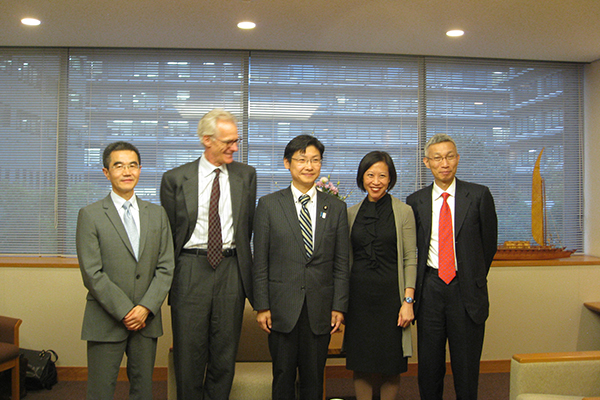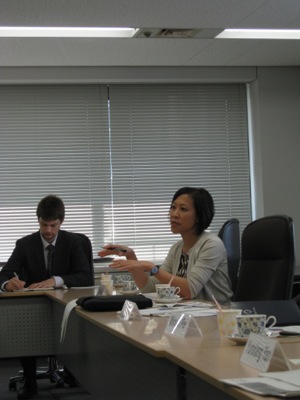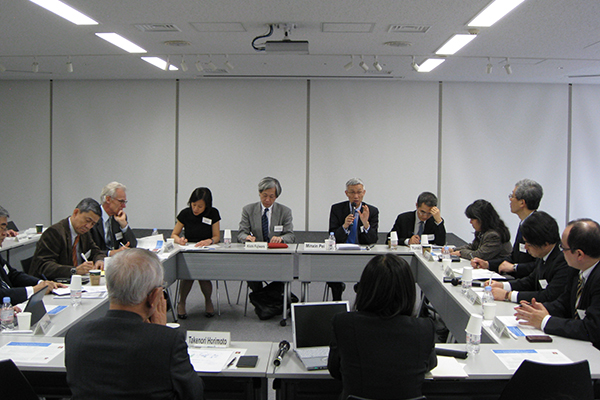


Fortifying an alliance
UD professor part of expert US delegation in Japan
10:42 a.m., May 2, 2013--In 2010, President Barack Obama met with the former Japanese Prime Minister Naoto Kan at the Asia-Pacific Economic Cooperation (APEC) in Yokohama, Japan. The two leaders discussed an alliance development initiative to strengthen the relationship between the two nations.
Alice Ba, director of the University of Delaware’s Asian Studies Program and associate professor of political science and international relations, traveled to Japan this March as part of the initiative.
Global Stories
Fulbright awards
Peace Corps plans
The Invitation Program for U.S. Experts on Asian Affairs, launched by the Japan Foundation Center for Global Partnerships (CGP), invited a four-person delegation consisting of U.S. scholars to meet and have discussions with a wide range of Japanese representatives.
“This is an initiative to facilitate greater exchange of ideas between the U.S. side and the Japanese side,” said Ba.
In just its second year, the program allows the U.S. delegation to exchange views with Japan’s policy-making, business and academic communities, civil society and media with the aim of fostering mutual understanding.
While Japan and the U.S. have been longstanding allies, the Obama administration has recently placed greater emphasis on the region with a foreign policy “rebalance” from the Middle East toward the Asia Pacific.
“When it comes to Japan and other East Asian states, the dilemma has to do with questioning U.S. commitments,” said Ba. “The Obama administration has pushed to convince Asian allies that the U.S. is not leaving anytime soon.”
This particular exchange is unique because the delegation is made up of four scholars, rather than government ambassadors or business advocates, according to Ba.
Discussing challenges
Ba and the U.S. delegation met with Japanese representatives from the Ministry of Foreign Affairs, the Ministry of Defense, Japan’s Atomic Energy Agency and the Ministry of Economy, Trade and Industry. In addition, the delegation met with representatives of the ruling Liberal Democratic Party (LDP) and journalists from major newspapers.
“It was a very educational experience for me,” said Ba. “It was interesting to see how they perceive their predicaments and the utility of U.S. commitments.”
The delegation discussed a number of challenges facing Japan, such as the after effects of the Fukushima nuclear plant destruction and aging nuclear plants across the country. Another prominent topic of discussion included Japan’s current foreign policy concerns with surrounding countries including North Korea and China.
The delegation also addressed an emerging controversial question.
Since World War II, Japan has had constitutional restraints on its military forces and its ability to project military force in Asia and beyond.
“Recently, there has been a lot of discussion about whether or not the LDP will revise the constitution,” said Ba. “Over the last 20 years, Japan’s leaders, in practice, have pushed both the constitutional and normative restraints on its ability to expand its military role. Our Japanese counterparts generally believe that Japan’s domestic politics are more conducive to making such constitutional changes today than they were previously.”
Representatives from the U.S. and Japan also placed great emphasis on the economic ties between the two major trading partners during the program, according to Ba.
Earlier this year, Japan made the critical decision to join U.S.-led negotiations on the Trans-Pacific Partnership (TPP), a proposed multi-national free trade agreement.
“The TPP is a major economic initiative,” said Ba. “It speaks to a common perception that even though the U.S. has been present securitywise, we have been faulted as neglecting economics. The TPP helps change that perception.”
Continued learning
The challenges and questions swirling around present day Japan accompanied Ba back to Delaware.
“It was a great opportunity to get a little bit of firsthand information and for me to bring it back to the students,” she said.
Ba is currently teaching a course titled “Southeast Asia and the World,” in which the subject of Japanese foreign policy, trade policy and its role in East Asian security have been of great relevance to class discussions.
Although students in the class are primarily Asian Studies and international relations majors, Ba believes it is important for all Americans to engage with East Asian and Japanese foreign affairs.
“We have a very strong interest in Asia and Japan and Japan values the U.S.,” she said.
About the Asian Studies Program
The University of Delaware offers an Asian Studies major and minor, in which students take courses on China, Japan, Southeast Asia and South Asia. Asian Studies in one of the larger area studies programs at the University.
The Asian Studies program is interdisciplinary in nature and provides many opportunities for enriched learning including study abroad trips, lecture and film series and student interest groups. It also works closely with the Center for Global and Area Studies (CGAS).
Article by Kelley Bregenzer










